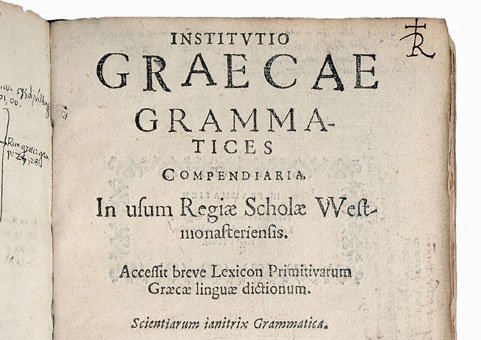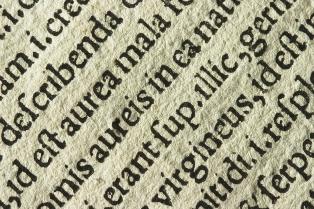Perseus digitized some Greek grammar resources early on (see below), but since then more has become available in .pdf form from thanks to Google Books and Archive.org. This survey for some reason does not include scans of books. One need in my view is for a good searchable school grammar of ancient Greek. The searchable ones currently available are of the more systematic variety, and are potentially bewildering to students and non-expert readers. Smyth and his 3048 chapters is not for everybody. The best choice in English in my opinion would be Goodell (see below). This spring DCC will be embarking on a project to digitize it properly, making it searchable, and integrating it into the notes of our forthcoming Greek commentaries. This will be done with crucial assistance from Bruce Roberson at Mount Allison University, and Rigaudon.
Another problem with the existing Greek grammar digitizations at Perseus is that the indices have not apparently been included. The index, as anyone who uses the print versions of these books will be aware, is the primary way that we consult these works, and not having the index amounts to a serious impediment to usability. Our Goodell will be browse-able via the index. And we are almost finished with a modification of the Perseus XML of Allen & Greenough’s New Latin Grammar that includes the index. We hope to make an index-browseable A&G available early in the new year.
Ok, here are some Greek grammars. Let me know your favorites, and if you think I am misguided in my love of Goodell.
Babbit, Frank Cole. A Grammar of Attic and Ionic Greek (New York: American Book Co., 1902). Google Books. archive.org
Buttman, Alexander. Grammar of the New Testament Greek (Andover: Warren F. Draper, 1891) at archive.org
Brugmann, Karl. Griechische Grammatik 3rd edition (Münich: Beck, 1900) at archive.org, and Google Books
Goodell, Thomas Dwight. A School Grammar of Attic Greek (New York: D. Appleton & Co., 1903) Google Books. Archive.org (better scan)
Goodwin, William W. Greek Grammar, revised and enlarged (Boston: Ginn & Co., 1896). Google Books.
Hadley, James. Greek Grammar for Schools and Colleges, revised and in part rewritten by Frederic De Forest Allen (New York: American Book Company, 1912) Google Books.
Meyer, Gustav. Griechische Grammatik, 2nd ed. (Leipzig: Breitkopf & Härtel, 1886) at archive.org and at Google Books (and another).
Monroe, D.B. A Grammar of the Homeric Dialect (Oxford: Clarendon, 1891) at archive.org.
These items are already available at Perseus:
Goodwin,William Watson. Syntax of the Moods and Tenses of the Greek Verb (London, Melbourne, Toronto 1889) Goodwin’s Moods and Tenses
Gildersleeve,Basil Lanneau. Syntax of Classical Greek from Homer to Demosthenes (New York 1900)
Smyth, Herbert Weir. A Greek Grammar for Colleges (1920) and (also at Philologic Chicago)
Kühner, Raphael, Friedrich Blass, and Bernhard Gerth. Ausführliche Grammatik der Griechischen Sprache (ed. Ildar Ibraguimov, Hannover und Leipzig, 1904).

